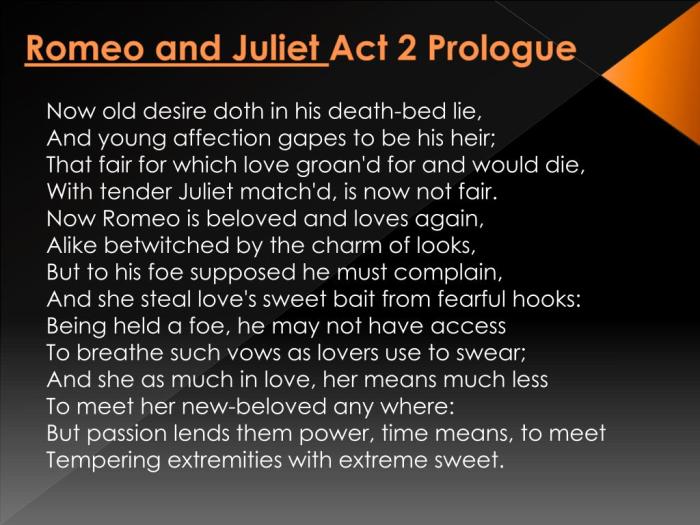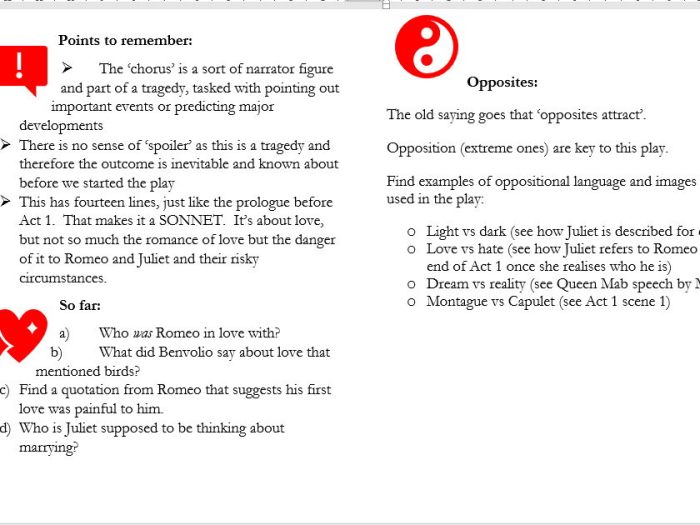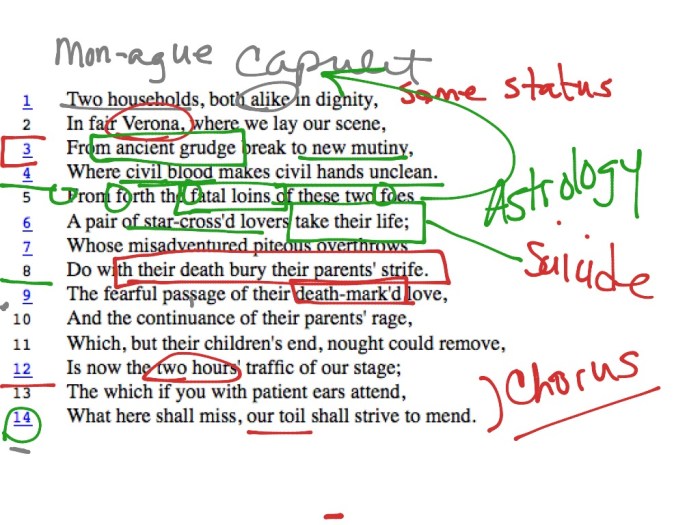Romeo and Juliet Act 2 Prologue Translation provides a profound glimpse into the intricacies of the play’s narrative, introducing themes, literary devices, and cultural influences that shape the unfolding drama.
The prologue serves as a crucial bridge between the exposition and rising action, setting the stage for the tragic events that follow.
Overview of Act 2, Prologue of Romeo and Juliet: Romeo And Juliet Act 2 Prologue Translation

The prologue in Act 2 of Romeo and Juliet serves a crucial purpose in setting the stage for the tragic events that are about to unfold. It introduces the main themes and motifs of the play, foreshadows future developments, and provides important context for the audience.
The prologue is spoken by the Chorus, a narrator figure who addresses the audience directly. The Chorus begins by reminding the audience of the events of Act 1, in which Romeo and Juliet fall in love at first sight. However, the Chorus also warns that their love is doomed from the start, as it is forbidden by their feuding families.
The Chorus goes on to describe the tragic events that will occur in Act 2. Romeo will be banished from Verona for killing Tybalt, Juliet’s cousin. Juliet will be forced to marry Paris, a suitor chosen by her father. In a desperate attempt to avoid this fate, Juliet will take a potion that will make her appear dead.
Romeo, believing Juliet to be dead, will take his own life. Juliet will awaken to find Romeo dead and will kill herself rather than live without him.
The prologue ends with a plea to the audience to “mark the sequel of their misery.” The Chorus foreshadows that the play will be a tragedy, but it also suggests that the audience will be moved by the lovers’ plight.
Translation and Interpretation of the Prologue
The prologue to Act 2 of Romeo and Juliet is written in Shakespearean English, which can be difficult for modern readers to understand. Here is a translation of the prologue into modern English:
Now old desire doth in his deathbed lie,And young affection gapes to be his heir; That fair for which love groaned for and would die, With tender Juliet matched, is now not fair.
Now Romeo is beloved and loves again, Alike bewitched by the charm of looks, But to his foe supposed he must complain, And she steal love’s sweet bait from fearful hooks.
Being held a foe, he may not have access To breathe such vows as lovers use to swear; And she as much in love, her means much less To meet her new beloved anywhere.
But passion lends them power, time means, to meet, Tempering extremities with extreme sweet.
The prologue uses a variety of literary devices, including metaphor, simile, and personification. The metaphor of “old desire” lying in its “deathbed” suggests that the lovers’ initial passion has died. The simile of “young affection gapes to be his heir” suggests that the lovers’ new love is eager to take the place of the old.
The personification of “love” as a person who “groaned” and “would die” suggests that love is a powerful force that can cause great pain.
The prologue also introduces several of the play’s main themes and motifs. The theme of love is central to the play, and the prologue shows how love can be both a source of great joy and great pain. The motif of fate is also introduced in the prologue, as the Chorus foreshadows the tragic events that will occur in the play.
Role of the Chorus in the Prologue
The Chorus plays an important role in the prologue to Act 2 of Romeo and Juliet. The Chorus serves as a narrator, providing context and background information for the audience. The Chorus also foreshadows events that will occur later in the play, and it comments on the actions of the characters.
The Chorus is a collective voice, representing the voice of the playwright and the audience. The Chorus speaks directly to the audience, addressing them as “you” and “your.” This direct address creates a sense of intimacy between the Chorus and the audience, and it allows the Chorus to share its insights and opinions with the audience.
The Chorus uses a variety of language and tone in the prologue. The Chorus is sometimes formal and serious, as when it describes the tragic events that will occur in the play. However, the Chorus is also sometimes playful and ironic, as when it comments on the lovers’ foolishness.
Impact of the Prologue on the Play
The prologue to Act 2 of Romeo and Juliet has a significant impact on the play. The prologue foreshadows the tragic events that will occur later in the play, and it sets the tone and atmosphere for the rest of the play.
The prologue’s foreshadowing of the tragic events helps to create a sense of suspense and anticipation in the audience. The audience knows that the lovers are doomed from the start, and this knowledge makes the play’s tragic events even more powerful.
The prologue also sets the tone and atmosphere for the rest of the play. The prologue’s use of dark and foreboding language creates a sense of doom and gloom. This atmosphere is sustained throughout the play, and it helps to create a sense of tragedy.
Cultural and Historical Context of the Prologue, Romeo and juliet act 2 prologue translation
The prologue to Act 2 of Romeo and Juliet was written in Elizabethan England, a time of great social and political change. The Elizabethan era was also a time of great cultural and artistic achievement, and the prologue to Romeo and Juliet reflects the values and beliefs of the time.
The prologue’s emphasis on fate and destiny reflects the Elizabethan belief in the power of fate. The Elizabethans believed that human beings were subject to the whims of fate, and that there was little that they could do to change their destiny.
The prologue’s use of classical allusions also reflects the Elizabethan interest in classical literature and mythology. The prologue’s reference to the story of Pyramus and Thisbe, a tragic love story from Ovid’s Metamorphoses, suggests that Shakespeare was familiar with classical literature and that he used it to inform his own work.
Common Queries
What is the significance of the prologue in Act 2 of Romeo and Juliet?
The prologue provides a summary of the events leading up to the play’s action, sets the scene for the ensuing conflict, and introduces the play’s central themes.
How does the prologue foreshadow the tragic events of the play?
The prologue’s description of the “star-cross’d lovers” and their “death-mark’d love” suggests the inevitability of their tragic fate.
What literary devices are used in the prologue?
The prologue employs a variety of literary devices, including metaphor, simile, personification, and foreshadowing, to create a vivid and evocative description of the play’s events and themes.


